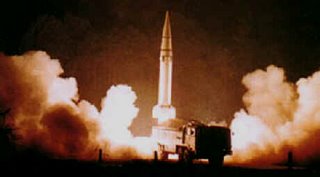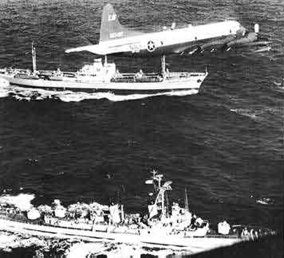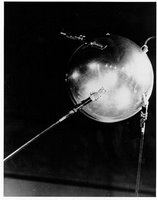The Spy Who Came In From the Cold War

AT THE THRESHOLD OF THE SIXTIES - the same year, in fact, that JFK became president - I joined the Air Force. Bob had joined a couple of years earlier, studied Chinese at Yale, and was diligently gathering intelligence in the nightclubs of Okinawa. I was so impressed with this escape plan that I began to consider it for myself. After all, what did I have to lose? I had just squeaked through high school, broken up with my girlfriend, had no job prospects and didn't have a clue as to what to do with my life. I was adrift in the world. Unable to bear a single minute more of nothing to do, I decided to go see this movie that everyone was talking about, a new Hitchcock film called Psycho. I could still catch a matinee at the Palace theater if I could just peel myself off the bank steps.
Perhaps the subtext of this film came a bit too close to my own desperate need to get out of town, I'm not really sure, but I began to get the uncomfortable sense that it was time to get my life in order by the time Marion Crane arrived at the Bates Motel, and I knew I had to take some kind of action after her heart-stopping episode in the shower. By the time her car disappeared beneath the surface of the pond, I had already decided to throw my fate to the wind. I had decided, like my brother before me, to become an international spy.
After slowly savoring my last piece of buttered popcorn, I left the theater and headed down Broadway to the Air Force recruiting center. Within weeks I was standing on the steaming tarmac at Lackland Air Force Base in Texas, with twenty or so other clueless recruits, awaiting the ritual shearing and precison herding exercises to follow, which would soon crush any romantic notions I had about being in the military. I had given up a heat wave in purgatory for the flames of hell.
I never did make it to Yale, but wound up studying Russian at Syracuse University, then shipping out to western Turkey to eavesdrop on Russian military activities from across the Black Sea. Situated on an old World War II British air base, our mission was to search out, tape and transcribe any radio transmissions of the Soviet military which might be relevant to NATO security interests. On our own free time, we were allowed to search out, communicate with, and date any women in Istanbul who might be relevant to our own personal interests. We threw ourselves into both missions with great abandon.
Regarding the intelligence gathering, there were a few memorable moments in what was, for the most part, a rather humdrum, monotonous activity; spinning the radio dials, listening to the metallic chatter of Russian bomber pilots on a midnight practice run over Novosibirsk, with an occasional colorful outburst of Russian profanity to keep us awake. One of those moments, however, threw everything we were doing into stark relief, revealing for a brief moment the deadly serious nature of our activities.
On October 16, 1962, JFK learned that there were Soviet missiles in Cuba, and suddenly every movement, every sound coming from the Soviet Union was a matter of life and death for the entire world. This was no longer a game, comrades. For nearly two weeks, our listening post was like the war room in Dr. Strangelove,
 every soul engaged in a mad and desperate effort to pinpoint and decipher what it was those damn Russkies were thinking and doing.
every soul engaged in a mad and desperate effort to pinpoint and decipher what it was those damn Russkies were thinking and doing.In the midst of this drama, word began to spread that the steel barrels now surrounding our building contained explosives, and that our commanding officer was under direct orders to blow the place up - with us in it - if the Russkies started to come over the Black Sea. We were top-secret, code-savvy human data banks that the military brass apparently couldn't afford to have fall into enemy hands. Needless to say, we were shocked to learn that we were expendable, that our own government would do this to us. It had a profound effect on the War Room, making the situation even more surreal.
Emotions reached a fever pitch by the 27th, when General Curtis LeMay, Air Force Chief of Staff (and the model for General Buck Turgidson in Dr. Strangelove), neglected to enforce Kennedy's orders to suspend all overflights, and a U-2 plane was shot down over Cuba and another nearly intercepted over Siberia. Russia's missile-laden ships were steaming toward Cuba where we had set up a blockade; the irresistable force would meet the immovable object by the morning of the 28th. The world's two superpowers were eyeball to eyeball, and no one appeared to be backing down.
I worked the midnight shift that night, and every single one of us were convinced that there would be no world to go back to when our shift ended. We spent the night sitting around, flipping the dial from the Voice of America to Radio Free Europe, waiting for them to go dead, signaling that we wouldn't make it home to say goodbye to our loved ones, that we would never make it to Paris or Rome. Then, just before dawn, a cheer went up when it was announced over the loudspeakers that Khrushchev had caved; they had struck a deal with us, the installations would be dismantled. We could start planning our trip to Paris.
My career as an international spy ended the following summer, just after we completed tracking Vostok 6, the satellite carrying Valentina Vladimirovna Tereshkova,
 Russia's first female cosmonaut. On the third night of the flight, we suddenly realized she would be flying right over our outpost. We all filed outside and stood in silent witness as the glow of her spacecraft made its way through the stars overhead, finally disappearing over the Sea of Marmora. It was another of those surreal Cold War moments: a group of young American soldiers standing on the soil of the old Ottoman Empire on a clear, moonless night, connected in some mysterious way with the cluster of Soviet cosmonauts hurtling through space directly above us. In spite of the vast distances and differences, we knew somehow we had shared a profound historical moment, though we would never meet them face to face. A few days later I would be back in the States, soon to begin another kind of war.
Russia's first female cosmonaut. On the third night of the flight, we suddenly realized she would be flying right over our outpost. We all filed outside and stood in silent witness as the glow of her spacecraft made its way through the stars overhead, finally disappearing over the Sea of Marmora. It was another of those surreal Cold War moments: a group of young American soldiers standing on the soil of the old Ottoman Empire on a clear, moonless night, connected in some mysterious way with the cluster of Soviet cosmonauts hurtling through space directly above us. In spite of the vast distances and differences, we knew somehow we had shared a profound historical moment, though we would never meet them face to face. A few days later I would be back in the States, soon to begin another kind of war.









